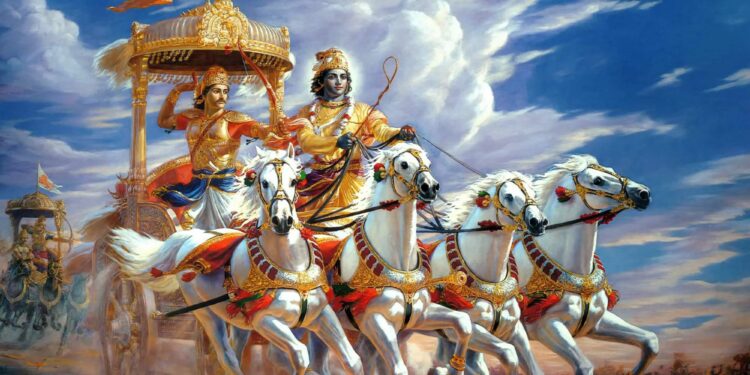TEXT 8
niyataṁ kuru karma tvaṁ
karma jyāyo hy akarmaṇaḥ
śarīra-yātrāpi ca te
na prasidhyed akarmaṇaḥ
SYNONYMS
niyatam—prescribed; kuru—do; karma—duties; tvam—you; karma—work; jyāyaḥ—better; hi—certainly; akarmaṇaḥ—than no work; śarīra—bodily; yātrā—maintenance; api—even; ca—also; te—your; na—never; prasidhyet—is effected; akarmaṇaḥ—without work.
TRANSLATION
Perform your prescribed duty, for doing so is better than not working. One cannot even maintain one’s physical body without work.
PURPORT
There are many pseudo meditators who misrepresent themselves as being great professional men of high parentage and who falsely pose that they have sacrificed everything for the sake of advancement in spiritual life. Lord Kṛṣṇa did not want Arjuna to become a pretender. Rather, the Lord desired that Arjuna perform his prescribed duties as set forth for kṣatriyas. Arjuna was a householder and a military general, and therefore it was better for him to remain as such and perform his religious duties as prescribed for the householder kṣatriya. Such activities gradually cleanse the heart of a mundane man and free him from material contamination. So-called renunciation for the purpose of maintenance is never approved by the Lord, nor by any religious scripture. After all, one has to maintain one’s body and soul together by some work. Work should not be given up capriciously, without purification of materialistic propensities. Anyone who is in the material world is certainly possessed of the impure propensity for lording it over material nature, or, in other words, for sense gratification. Such polluted propensities have to be cleared. Without doing so, through prescribed duties, one should never attempt to become a so-called transcendentalist, renouncing work and living at the cost of others.
TEXT 9
yajñārthāt karmaṇo ‘nyatra
loko ‘yaṁ karma-bandhanaḥ
tad-arthaṁ karma kaunteya
mukta-saṅgaḥ samācara
SYNONYMS
yajña-arthāt—done only for the sake of Yajña, or Viṣṇu; karmaṇaḥ—than work; anyatra—otherwise; lokaḥ—world; ayam—this; karma-bandhanaḥ—bondage by work; tat—of Him; artham—for the sake; karma—work; kaunteya—O son of Kuntī; mukta-saṅgaḥ—liberated from association; samācara—do perfectly.
TRANSLATION
Work done as a sacrifice for Viṣṇu has to be performed; otherwise work causes bondage in this material world. Therefore, O son of Kuntī, perform your prescribed duties for His satisfaction, and in that way you will always remain free from bondage.
PURPORT
Since one has to work even for the simple maintenance of the body, the prescribed duties for a particular social position and quality are so made that that purpose can be fulfilled. Yajña means Lord Viṣṇu or sacrificial performances. All sacrificial performances also are meant for the satisfaction of Lord Viṣṇu. The Vedas enjoin: yajño vai viṣṇuḥ. In other words, the same purpose is served whether one performs prescribed yajñas or directly serves Lord Viṣṇu. Kṛṣṇa consciousness is therefore performance of yajña as it is prescribed in this verse. The varṇāśrama institution also aims at satisfying Lord Viṣṇu. Varṇāśramācāravatā puruṣeṇa paraḥ pumān / viṣṇur ārādhyate [Cc. Madhya 8.58] (Viṣṇu Purāṇa 3.8.9).
Therefore one has to work for the satisfaction of Viṣṇu. Any other work done in this material world will be a cause of bondage, for both good and evil work have their reactions, and any reaction binds the performer. Therefore, one has to work in Kṛṣṇa consciousness to satisfy Kṛṣṇa (or Viṣṇu); and while performing such activities one is in a liberated stage. This is the great art of doing work, and in the beginning this process requires very expert guidance. One should therefore act very diligently, under the expert guidance of a devotee of Lord Kṛṣṇa, or under the direct instruction of Lord Kṛṣṇa Himself (under whom Arjuna had the opportunity to work). Nothing should be performed for sense gratification, but everything should be done for the satisfaction of Kṛṣṇa. This practice will not only save one from the reaction of work, but also gradually elevate one to transcendental loving service of the Lord, which alone can raise one to the kingdom of God.


















